

ACER Online Assessment and Reporting. Untitled. Course: Results plus - Language Disorder. Fillable Online ED155 Injury Report Form Fax Email Print - PDFfiller. Teaching a Class With Big Ability Differences. Untitled. Intranet Login. Mobile. Authors Edited by Samuel C.
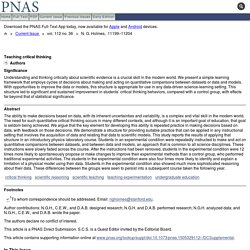
Silverstein, College of Physicians and Surgeons, New York, NY, and accepted by the Editorial Board July 14, 2015 (received for review March 17, 2015) Significance Understanding and thinking critically about scientific evidence is a crucial skill in the modern world. Seven Habits of Highly Effective Teens. DECD plink - Login. ‘Not a Math Person’: How to Remove Obstacles to Learning Math. Stanford math education professor Jo Boaler spends a lot of time worrying about how math education in the United States traumatizes kids. Recently, a colleague’s 7-year-old came home from school and announced he didn’t like math anymore.
His mom asked why and he said, “math is too much answering and not enough learning.” This story demonstrates how clearly kids understand that unlike their other courses, math is a performative subject, where their job is to come up with answers quickly. Boaler says that if this approach doesn’t change, the U.S. will always have weak math education. 10 Ways Teacher Planning Should Adjust To The Google Generation. 10 Ways Teacher Planning Should Adjust To The Google Generation by Terry Heick For the Google Generation, information isn’t scarce, and knowing has the illusion of only being a search away.
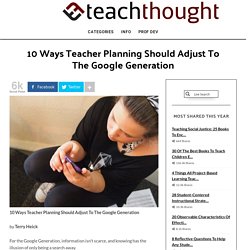
What Anxiety Does To Your Brain And What You Can Do About It. We all deal with anxiety in some form day to day.
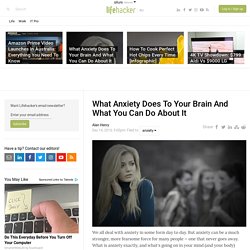
But anxiety can be a much stronger, more fearsome force for many people — one that never goes away. What is anxiety exactly, and what's going on in your mind (and your body) when anxiety strikes? How do you cope when it takes hold? Photos by oliveromg (Shutterstock), sanguineseas, Fod Tzellos, Quinn Dombrowski, M. Dolly, Karen, Africa Studio (Shutterstock), Supermac1961. Teachers' Portal. Explore Modules. Inquiry Learning. From HookED Wiki HOT Inquiry Self Assessment Rubrics Toc(For Professional Discussion within schools working with Hooked on Thinking on Inquiry Learning) HOT Rubrics for Stages in Research Process: File:HOT RESEARCH INQUIRY RUBRIC BLANK.pdf HOT Rubrics for Stages in Inquiry Process.
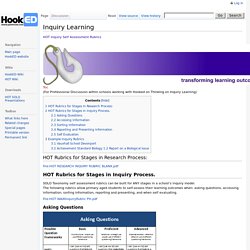
Education Research Highlights From 2015. 2015 was a great year for education research. fMRI technology gave us new insight into how exercise can improve math ability by changing the structure of children's brains (#13 below).
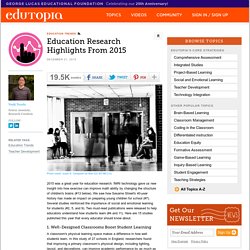
We saw how Sesame Street's 40-year history has made an impact on preparing young children for school (#7). Several studies reinforced the importance of social and emotional learning for students (#2, 5, and 9). Two must-read publications were released to help educators understand how students learn (#4 and 11). Here are 15 studies published this year that every educator should know about. 1. A classroom's physical learning space makes a difference in how well students learn.
Barrett, P. How to Bring Playfulness to High School Students. It’s easy to focus on academics and college transcripts when children become tweens and teens, but retaining the agency and creativity inherent in play is crucial for them, too.
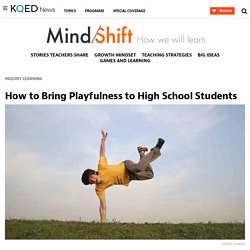
But what is the high school equivalent for the kind of inquisitive learning that happens when little kids play in the sandbox, finger-paint, build with blocks or play make-believe? “When your 4-year-old is dipping his hand in the rice table, he’s learning really important things about tactile touch,” said Denise Pope, senior lecturer at Stanford’s Graduate School of Education and co-founder of Challenge Success.
“Older kids need those same tactile, hands-on experiences to learn as well.” The Australian Directory of School Activities, Excursions and Accommodation. Developing a Growth Mindset in Teachers and Staff. The New Psychology of Success (2000), Dweck developed a continuum upon which people can be placed, based upon their understandings about where ability comes from. For some people (at one end of said continuum), success (and failure) is based on innate ability (or the lack of it).
Deck describes this as a fixed theory of intelligence, and argues that this gives rise to a ‘fixed mindset’. At the other end of the continuum are those people who believe success is based on a growth mindset. Socrative. Login. Families SA - Login. Just what is DEEP learning? We’ve been out running professional learning with hundreds of teachers so far this year and two of the popular the buzz words seem to be ‘deep learning’ and ‘powerful learners’.
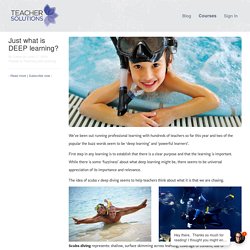
Create & Find Multimedia Lessons in Minutes. Student Behaviour Management – A handbook for teachers. DECD plink. Pccolemerged. Multiliteracies Teacher - The 'What' of Multiliteracies. The “what” of their pedagogy has, at its core, a metalanguage of multiliteracies based on the concept of design.
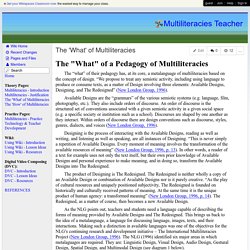
“We propose to treat any semiotic activity, including using language to produce or consume texts, as a matter of Design involving three elements: Available Designs, Designing, and The Redesigned” (New London Group, 1996). Available Designs are the “grammars” of the various semiotic systems (e.g. language, film, photography, etc.). They also include orders of discourse. An order of discourse is the structured set of conventions associated with a given semiotic activity in a given social space (e.g. a specific society or institution such as a school).
Discourses are shaped by one another as they interact. Designing is the process of interacting with the Available Designs, reading as well as writing, and listening as well as speaking, are all instances of Designing. The product of Designing is The Redesigned. Of 2 Minds: How Fast and Slow Thinking Shape Perception and Choice [Excerpt] To survive physically or psychologically, we sometimes need to react automatically to a speeding taxi as we step off the curb or to the subtle facial cues of an angry boss.
![Of 2 Minds: How Fast and Slow Thinking Shape Perception and Choice [Excerpt]](http://cdn.pearltrees.com/s/pic/th/thinking-perception-excerpt-129510293)
That automatic mode of thinking, not under voluntary control, contrasts with the need to slow down and deliberately fiddle with pencil and paper when working through an algebra problem. These two systems that the brain uses to process information are the focus of Nobelist Daniel Kahneman's new book, Thinking, Fast and Slow (Farrar, Straus and Giroux, LLC., 2011). The following excerpt is the first chapter, entitled "The Characters of the Story," which introduces readers to these systems. (Used with permission.) Understanding fast and slow thinking could help us find more rational solutions to problems that we as a society face. Mindfulness exercises. Mindfulness exercises allow you to be able to identify, tolerate and reduce difficult, painful and even frightening thoughts, feelings and sensations.
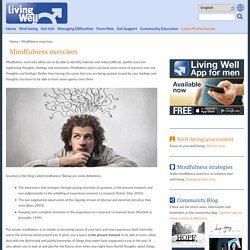
Mindfulness gives you back some sense of mastery over our thoughts and feelings. Rather than having the sense that you are being pushed around by your feelings and thoughts you learn to be able to have some agency over them. So what is this thing called mindfulness? Smiling Mind. Smiling Mind aims to build happier, healthier and more compassionate young people. Our Mindfulness Meditation programs are designed to assist people in dealing with the pressure, stress and challenges of daily life.
Smiling Mind's Education Programs are designed: As a preemptive and proactive tool to enhance mental health and wellbeing To arm students with the skills to better manage stress and build resilience To encourage participants to feel calm, clear and content. The program has been developed to complement existing mental health, wellbeing and pastoral care programs, and can be used in a variety of ways, including: As part of classroom activities, session training, daily routine or roll call As part of wellbeing or pastoral care programs, sessions or lessons As a general supplement and support to the everyday curriculum.
Introductory Sessions: These outline the key learnings of Mindfulness Meditation. TregoED: Education Leader Log in. The 7 Habits of Highly Effective Teens. DECD_TfEL PILOT_Non-googleable questions_download_web. PersonalDevelopmentCareerPlanning9 10SupplementalResource. Level6_TE_Sampler. 7 Habits. 7 Habits of Highly Effective Students. 4 Rituals That Will Make You Happy, According to Neuroscience. What's changed - - The Australian Curriculum v8.0. Revisions have been made to the previously available Australian Curriculum to make the curriculum easier to manage, particularly for primary schools, to simplify the curriculum’s presentation and to strengthen the focus on literacy. To achieve this: The volume of content in learning areas has been reduced by deleting, clarifying and simplifying content descriptions, where appropriate, and moving references to examples to the content elaborations.
This has improved clarity of content descriptions and has resulted in an overall reduction in the number of content descriptions in the curriculum.A single Foundation – Years 6/7 Humanities and Social Sciences learning area replaces the History, Geography, Civics and Citizenship, and Economics and Business subjects at these year levels. The Tracked changes for Foundation – Year 10 Australian Curriculum document (PDF 2.9 mb) is available on the Australian Curriculum website. Changes to the F 10 Australian Curriculum. ACER > Online Assessment and Reporting. Edutopia sur Twitter : "RT @E_Sheninger: The Need For Digital Literacy: #digcit...
Schools Online > Login Page. Online.cdu.edu. The Teacher's Guides To Technology And Learning. SWGfL Digital Literacy - Curriculum Overview. SWGfL Digital Literacy - Curriculum Overview. 40 maps that explain the internet.
Session A - When the educational neuroscience meets the Australian curriculum : a strategic approach to teaching and learning - viewcontent.cgi. Skills and skillability by Martin Westwell on Prezi. DayMap. Solution Fluency. My Unit Plans. Standards. Report Child Abuse. Learning Dashboard. Wikis for Everyone - Wikispaces. TheDawsonarium - home.